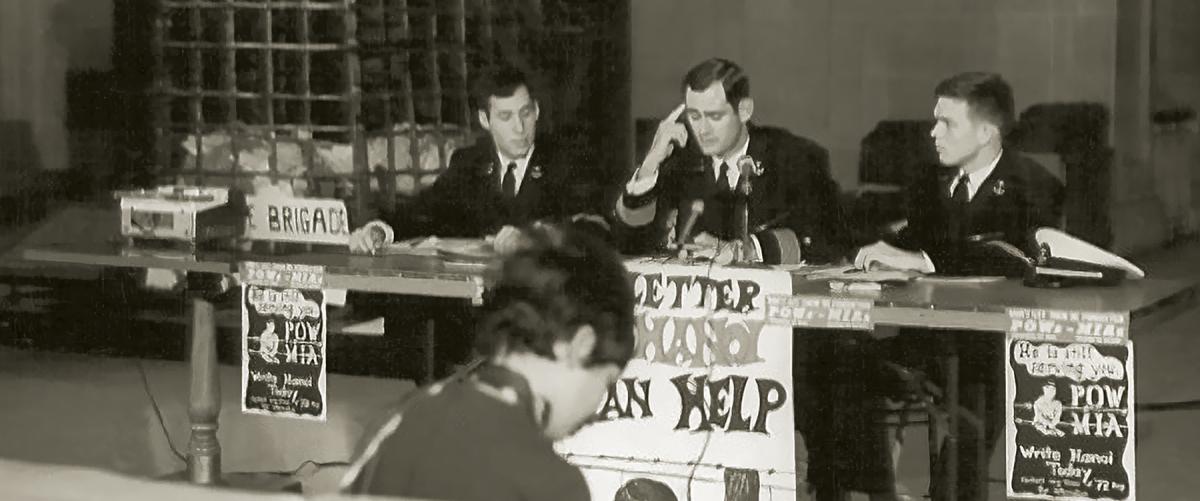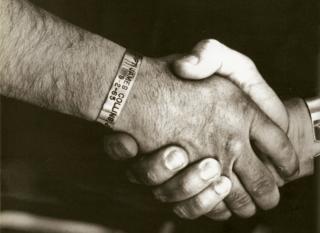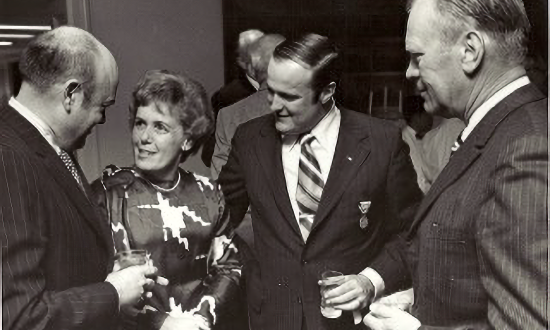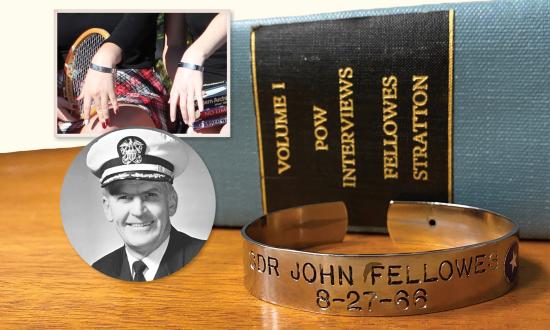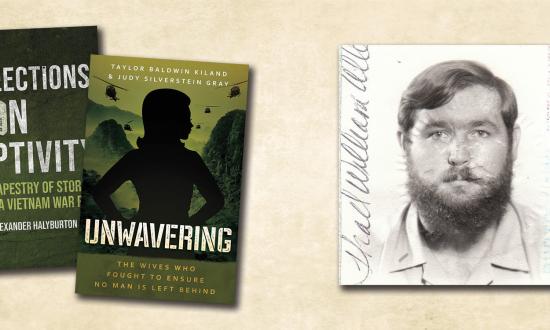This year marks the 50th anniversary of the return of the American prisoners of war from Vietnam. While their timely return after the end of the war is attributed to the tenacious political campaign waged by the wives of the prisoners led by Sybil Stockdale, two midshipmen at the U.S. Naval Academy led another letter-writing campaign to support the families and children of the POWs.
The midshipmen’s story is included in H. Michael Gelfand’s 2006 book, Sea Change at Annapolis, but their efforts were largely unreported at the time.1
Activism at Annapolis
In fall 1970, in the rotunda of Bancroft Hall, the U.S. Naval Academy hung photographs of graduates who had been killed in action (KIA) or were missing in action (MIA) in Vietnam. Each week additional names were added, and by fall 1972, the display included more than 130 service members.
After the son of a Vietnam prisoner of war (POW) dined with the Brigade, two midshipmen, Rick Rubel and Joe Glover of the class of 1972, decided to pass a hat around the mess hall to raise money to buy the children of MIAs and POWs Academy sweatshirts for Christmas. The Brigade responded, contributing more than $5,000, and midshipmen who lived near these families delivered the gifts over the winter break.
Rubel also promoted a campaign at the Naval Academy that sold thousands of bracelets inscribed with the names of POWs by the nonprofit organization Voices in Vital America.
Still hoping to do more, Glover contacted Naval Academy alumnus and fellow Texan H. Ross Perot. While at Annapolis, Perot was a classmate of William Lawrence—now a POW in Vietnam. Together, Perot and the two midshipmen proposed a letter-writing campaign to try to convince North Vietnam to improve conditions for POWs. Rubel became the Brigade chairman for the campaign, and Glover wrote a pamphlet encouraging midshipmen, West Point cadets, and the American public to write letters to Ho Chi Minh.
Perot provided the Academy a replica of a bamboo cage like the one in which American POW Nick Rowe had been imprisoned. Army Colonel Rowe—one of only 34 American POWs to escape during the Vietnam War—was held in a bamboo cage for most of his 64 months of captivity. He would go on to create the U.S. Army’s SERE (Survival, Evasion, Resistance, Escape) program for high-risk military personnel.
The replica was set up in Bancroft Hall and was in the background when Rubel, Glover, and Midshipman Brigade Commander Mike Hecomovich held a press conference to publicize the letter-writing campaign.
The letters received at the Academy were placed in the bamboo cage, but they quickly overflowed and were stacked on the floor. By the end of November, there were more than 15,000 letters.
Army-Navy Game
The 1970 Army-Navy football game would be played on 28 November in Philadelphia. Rubel, Glover, and Perot contacted Secretary of the Navy John Warner, who authorized a half-time ceremony to present the letters to the wives of POWs. However, as the New York Times reported in “Camp Raiders Honored at the Half of Army-Navy Game,” the ceremony was upstaged by a presentation by Secretary of Defense Melvin Laird honoring the Army soldiers who had participated in the daring raid on the Son Tay POW camp that had been revealed the week before. (The camp held no POWs.)
But not to be forgotten, during the half-time show, which was televised on ABC, the Chairman of the Joint Chiefs, Admiral Thomas Moorer, introduced Hecomovich to explain the scene as a postal delivery truck drove up to a platform where Rubel and Glover were standing. The two midshipmen then presented the letters they had gathered to Joan Vinson, wife of Lieutenant Colonel Bobby Gene Vinson, then listed as MIA, and the national coordinator of the National League of Families of American Prisoners of War and Missing in Southeast Asia. Needless to say, the wives were grateful, and the letters were later airlifted to North Vietnam.
In his book, Gelfand recalls Rubel telling him: “We wanted to help to personalize the POW situation, and at the Army-Navy game, we made the point. The whole process caught fire because midshipmen felt this was something they could do, not to affect the war, but to be part of the recognition [of POWs]. . . . That is why midshipmen latched on [to our project].”
No Greater Love
At the close of 1971, Rubel and Glover were just a few months from graduation, but they wanted to find a way to continue a campaign for the children. In December, they invited to the Naval Academy football great Johnny Unitas and five other members of the Baltimore Colts; Vince Promuto of the Washington Redskins; and former White House aide Carmella LaSpada, who had organized America’s Athletes for POWs-MIAs.2 Rubel and Glover teamed with the sports stars to recruit some 500 midshipmen to be pen-pals with children of servicemen missing or captured in Vietnam.3 LaSpada, who suggested the name “No Greater Love,” became the program coordinator and went on to recruit other legendary entertainers and athletes to the group, including Joe DiMaggio, Althea Gibson, Joe Louis, Jesse Owens, Arnold Palmer, Ted Williams, Joe Frazier, Brooks Robinson, Don Schollander, Bobby Orr, and Jerry West.
Less than two years after Rubel and Glover graduated, the POWs were freed.
Rick Rubel and Joe Glover never received any official recognition for their work. It is time for these two former midshipmen to be honored for their empathy, their creativity, and their efforts to bring attention and comfort to the families of Vietnam POWs and MIAs. You could say they were on their way to becoming distinguished graduates of the U.S. Naval Academy even before they graduated—and that puts them in a class by themselves.
1. H. Michael Gelfand, Sea Change at Annapolis: The U.S. Naval Academy, 1949–2000 (Chapel Hill, NC: University of North Carolina Press, 2006), 207–8.
2. “About Us,” No Greater Love.
3. Art Jaeger, “Midshipmen Help Launch ‘Sports Stars’ POW Effort,” Navy Times, 15 December 1971.



